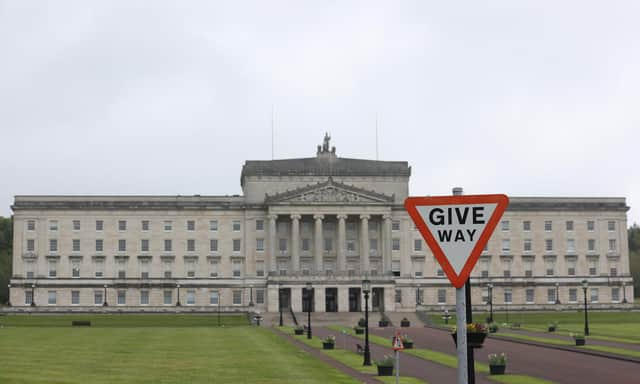Stormont returns: MLAs gather at Parliament Buildings to appoint executive ministers


The DUP has agreed to the recall of the political institutions on the back of its deal with the Westminster Government, which party leader Sir Jeffrey Donaldson says has effectively removed the so-called Irish Sea trading border.
On Thursday, two pieces of legislation contained in the agreement were fast-tracked through the House of Commons, opening the way for the Assembly to return.
Advertisement
Hide AdAdvertisement
Hide AdBusiness will begin with the election of a Stormont speaker, followed by nominations for the offices of first and deputy first minister.
Sinn Fein vice president Michelle O’Neill will take the first minister role due to Sinn Fein winning the most seats in the 2022 election. The DUP has not said who it will nominate for deputy first minister, although speculation is Emma Little-Pengelly could get the role.
A series of ministerial positions across Stormont departments will then be filled, using the D’Hondt mechanism based on party strengths.
Party leaders met on Friday at Stormont Castle to discuss priorities for the incoming executive.
Advertisement
Hide AdAdvertisement
Hide AdSpeaking after the meeting, Sir Jeffrey said: “It is important when the executive meets that we have a real sense of what those priorities are for everyone in Northern Ireland.
“We are looking forward to the Assembly meeting, going through the formalities, getting devolution restored.”
Key among the priorities for new ministers will be dealing with the budget crisis affecting public services across Northern Ireland.
The Government has offered a £3.3 billion package to secure the region’s finances when the Assembly returns, including £600 million to settle public sector pay claims.
Advertisement
Hide AdAdvertisement
Hide AdHowever, Sir Jeffrey indicated that the parties would be working together to secure more money from the Treasury.
He added: “The finance piece is unfinished business which we intend to finish.”
While Sir Jeffrey has secured the backing of a majority of party colleagues to accept the deal, some within the DUP remain deeply sceptical of the agreement to restore powersharing.
The DUP leader is also facing opposition from elements of unionism outside his party.
Advertisement
Hide AdAdvertisement
Hide AdHis deal with the Government commits to replacing the Windsor Framework’s green lane process at Northern Ireland ports, which requires percentages of goods to be checked as they arrive from Great Britain, with a “UK internal market system” that will govern the movement of goods that remain within the United Kingdom.
Checks would still be carried out but on a risk-based/intelligence-led model to combat illegality and disease, rather than routine stops of disembarking lorries.
Businesses using the internal market system would also need to be signed up to a trusted trader scheme.